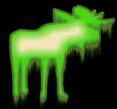
Introduction 
Introduction 
Introduction
|

Dark Matter. Doesn't it just sound awesome? DARK MATTER. But what is Dark Matter?
Well, no, no, definitely no, and no you Star Wars yuppie! Dark Matter may sound mystical and mysterious, but it is just another name cosmologists give to stuff we can detect but not observe. Or rather, we can measure its gravitational effect in space-time, but it is not emitting light of any wavelength which we can detect in the electromagnetic spectrum. Back in the early 1930's, astronomer Fritz Zwicky discovered that the mass of luminous material in a cluster of galaxies was far less than the total mass of the cluster implied by its angular (rotating) velocity. Today, we prefer to call this missing mass "Dark Matter" because it is truly the light, not the matter, that is missing. Based on over 70 years of galactic observations, contemporary cosmologists believe that as much as 90% (percent) of the stuff that makes up the universe may be Dark Matter. In other words, for every gram of light emitting ordinary stuff, there may be 9 grams of the Dark stuff.
|




